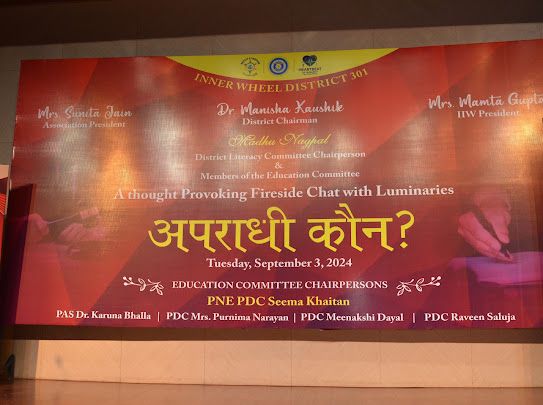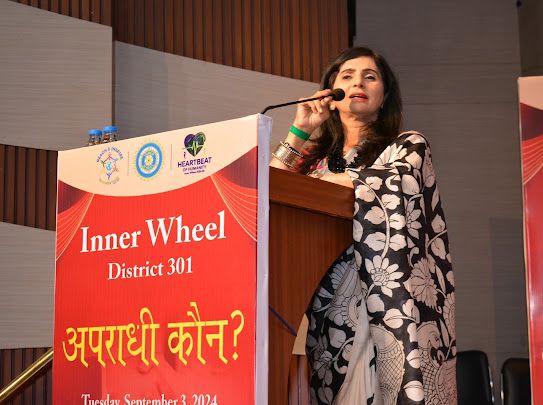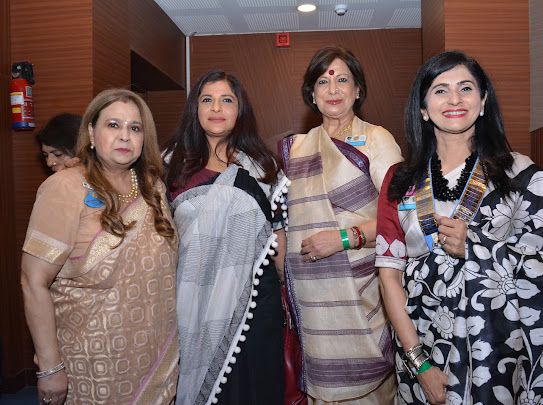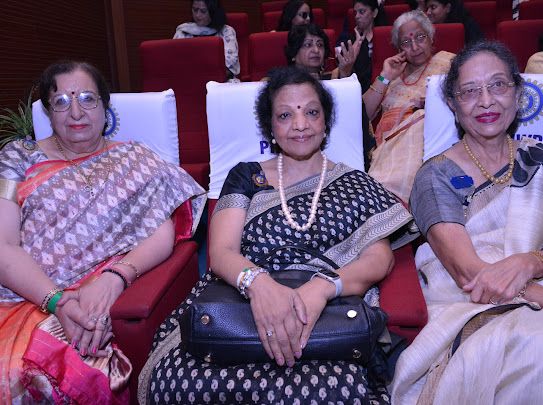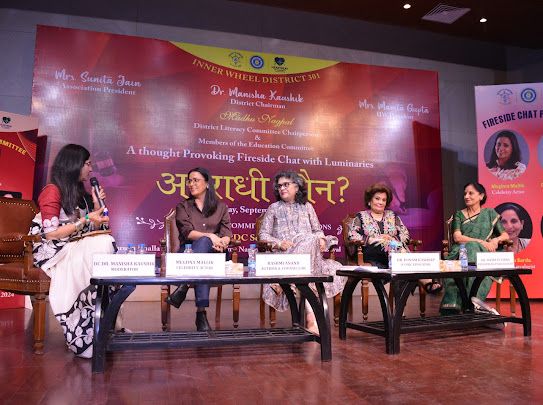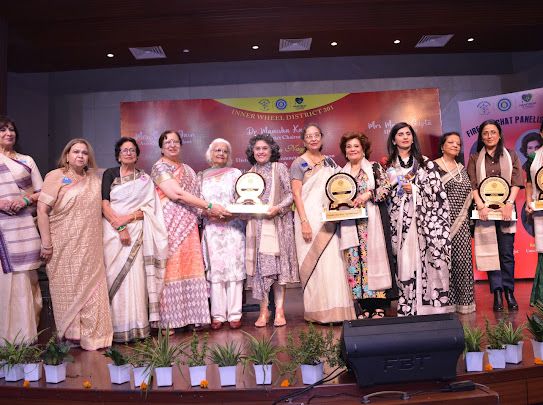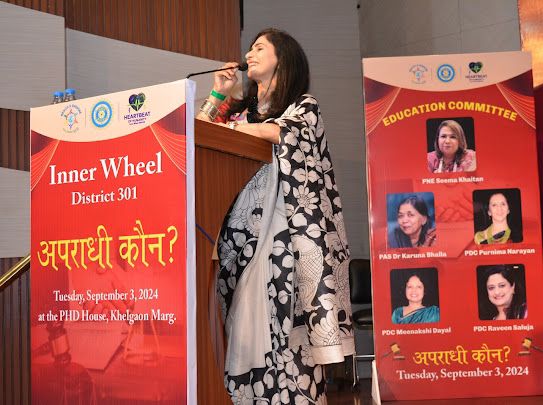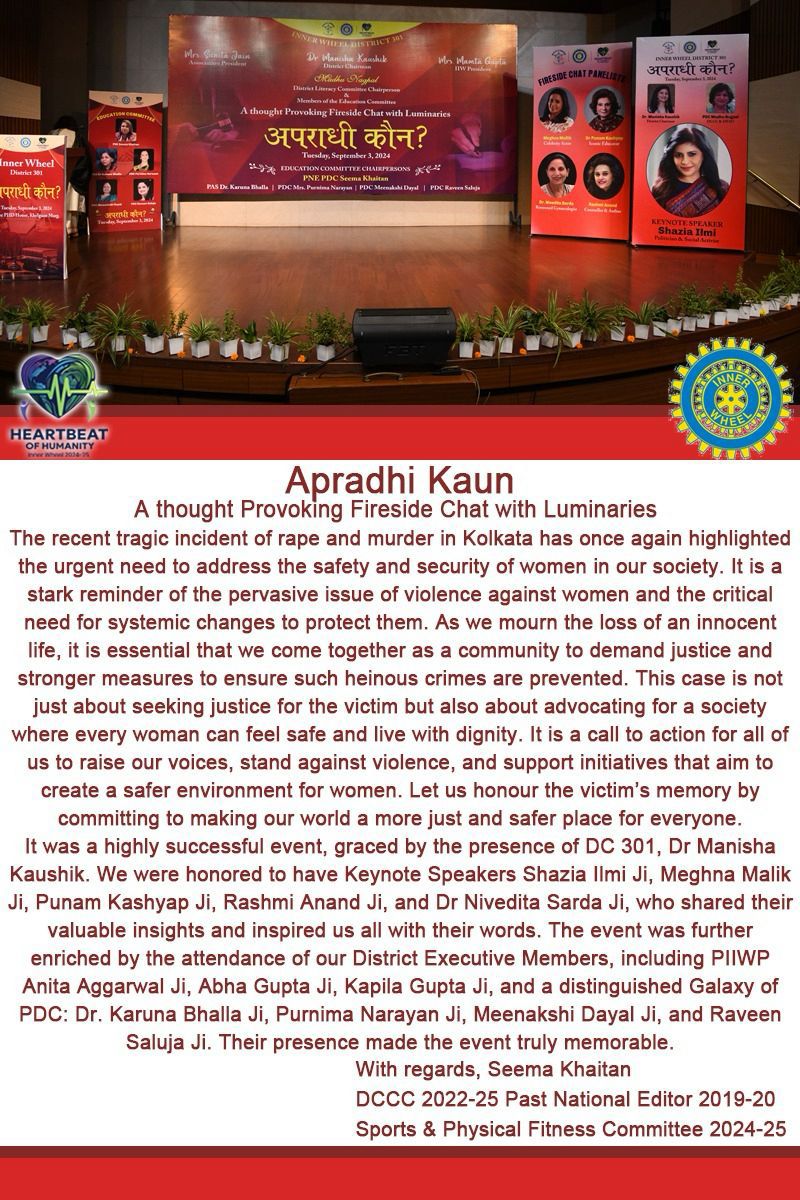On 3rd September, District-301 Education & Literacy Committee organized a unique and innovative Fireside Chat Show titled Apradhi Kaun. This first-time event was conceived and curated by our dynamic District Chairman, Dr. Manisha Kaushik, with DESO PDC Mrs. Madhu as the MOC, and was generously sponsored by PNE/DCCC Mrs. Seema Khaitan.
The program was conceptualized in response to the horrific incident at RG Kar Hospital, Kolkata, where a junior female doctor was gang-raped and killed while on duty. The nation was left in shock by the brutality of the crime. While public outrage continues, the lack of justice remains a serious concern. In light of this, as responsible citizens, we felt it was necessary to confront this deeply troubling issue, which is often pushed to the sidelines of societal discourse.
Dr. Manisha Kaushik, along with DESO and DCCC, took the initiative to gather a distinguished panel of women—experts in their respective fields—to critically evaluate the current situation and discuss ways to drive positive change in society.
The event began with a formal ceremony to honor the dignitaries present. Following this, the audience was treated to a mesmerizing dance performance by the girls of the Sarvam Foundation, an NGO that supports underprivileged girls by providing education and training. Their performance was both inspirational and emblematic of empowerment.
Next, a nukkad natak (street play) was performed, focusing on various crimes committed against women. The sensitive and evocative portrayal of these issues resonated deeply with the audience, setting the stage for the evening’s discussions.
The first speaker, and guest of honor, was Ms. Shazia Ilmi—a prominent journalist, politician, and social activist. Her address, delivered with calm intensity, was both thought-provoking and eye-opening. Speaking extempore from the heart for over half an hour, Ms. Ilmi captivated the audience with her insights on societal divisions and gender bias. She discussed how women, based on their anatomy, are often subjugated and controlled by male dominance, a reality that persists despite societal progress. Ms. Ilmi shared her personal experiences and emphasized that even the most emancipated women face instances of male dominance and aggression at some point in their lives. She urged the audience to acknowledge and eradicate these gender biases, suggesting practical solutions that can be implemented in everyday life to gradually bring about positive societal change.
In the second half of the program, four distinguished panelists joined Dr. Manisha Kaushik on stage to discuss the prevailing issues surrounding gender violence. Each panelist brought a wealth of knowledge and experience to the conversation.
The first panelist, Meghna Mallik, a celebrated television actress known for her recent work in a popular web series, shared her thoughts on how male dominance has shaped society. She encouraged women to take charge of their lives and break through the societal “glass ceiling.”
The second panelist, Mrs. Punam Kashyap, a renowned educationist with years of experience working in both India and the Middle East, highlighted the critical role education plays in empowering women. She shared her observations on how countries in the Middle East handle criminality with strict laws, noting that the fear of severe punishment often acts as a deterrent for potential criminals.
The third panelist, Ms. Rashmi Anand, shared her deeply personal story of surviving physical and emotional abuse in her marriage. With two children and no external support, Ms. Anand overcame tremendous challenges and now dedicates her life to helping other women in similar situations. Through her work with various NGOs, she provides support and guidance to women suffering from suppression and abuse.
Finally, the fourth panelist, Dr. Nivedita Sarda, a gynecologist, contributed her medical expertise to the discussion. She spoke about the physical and psychological trauma experienced by victims of gender-based violence and emphasized the importance of recognizing these issues to provide comprehensive care and support.
The discussion was a profound reflection on how society can begin to address and resolve gender-based violence, focusing on education, legal reforms, and the need for women to support each other in this fight for justice and equality.



